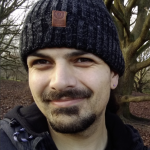This month we’re getting to know Pedro Elston from the Institute of Health Sciences Education.
Who am I?
My name is Pedro Elston and I am a Lecturer in Medical Education (e-learning). I am also the Head of E-Learning for the Institute of Health Sciences Education, so I have an academic role in managing how we teach students online. I oversee the resources that we have, the creation of new things and experimental directions that we are going in, while providing support for areas such as mixed-mode education.
I joined QMUL just over 1 year ago and I came from St. George’s University. I have a PhD in skeletal tissue biochemistry, so I’ve come from research and got involved in curriculum design. Before research and my PhD, I taught science in a secondary school.
My team
There are currently four excellent people in my team, with one role vacant that will hopefully be filled soon, and we provide general support to our institute. One colleague is a technology support officer who manages our ePortfolio system. Another colleague is a technologist who specifically focuses on the virtual learning environment and providing support to academics in terms of creating their pages and other areas where they require support.
Projects I am currently working on
Currently, we have two large projects on the go. One is virtual reality technology where we have about ten headsets and a couple of HoloLens headsets. We’re exploring how we can use these tools with the anatomy department and our students support unit to help students both in teaching and learning, mental health, and mindfulness. The idea is that from this academic year, all our students for the first time are going to have some sort of virtual reality experience. The anatomy team are really dedicated and I’m very grateful for that. So, every student is going to get about ten minutes each over the course of the year. It’s a flavour, and perhaps we’ll do some more later down the line. The university is considering getting spaces specifically for VR related activities and we might expand that in the future. But it seems like medical education at least, is starting to move into that space because there are a lot of practical elements to it. And getting enough placement time is difficult, so it could be a good supplement.
The other thing that I’m working on is a project with the new Dean for Digital Education, Chie Adachi, who joined recently QMUL. Higher Education England gave our course about £250,000 to develop an augmentation to our medical degree to make it more blended. And the idea behind that is to eventually make it more accessible to people that can’t necessarily travel in all the time, for example if someone has caring responsibilities or they need to work around their studies, that introduces a lot more flexibility.
What I enjoy doing
I run a group of learning technologists and academics for the Medical Schools Council, which is a body that represents all the medical schools in the UK. We’ve recently put out a nice report on mixed mode education/hybrid learning.
I quite like writing and I’m currently working on a fantasy novel that’s eating into quite a bit of my time. I also have a virtual reality headset at home, and I quite enjoy playing around with the technology. I play a lot of games that are around logic, puzzles or problem-solving, such as ‘Slay the Spire’ and ‘Rust’.
Fun fact
I have two YouTube channels from when I was a kid. One of them is for playing piano and the other one is game footage. About a year ago I reached one million views across both channels but I’d be far too embarrassed to share the stuff on them now!



